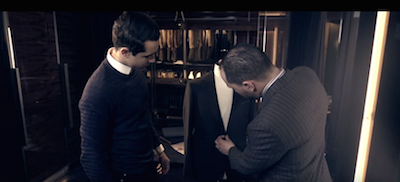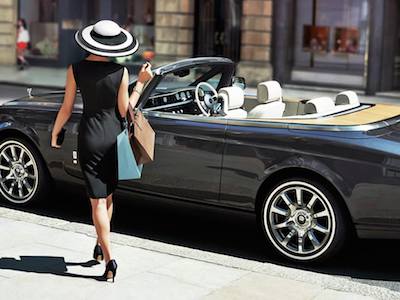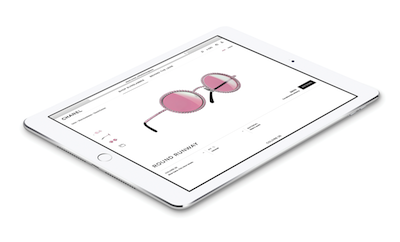 Image courtesy of Ferragamo
Image courtesy of Ferragamo
While the recession may be over, the general luxury consumer attitude of today is a discerning, cost-conscious one, according to new research from Annalect.
Close to three quarters of consumers say they look for the best price when buying luxury goods, and 60 percent believe that luxury does not necessarily have to mean expensive. However, even these careful buyers can be swayed with the right approach, as 40 percent expect to spend more on luxury items in the next 12 months.
"We think that affluent consumers are definitely discerning, not just about price, but about other qualities and there are other criteria that they consider when they are making choices between two or more luxury brands," said Pamela Marsh, director, Primary Research and Insights at Annalect.
"And so, yes they’re after quality, yes they are price conscious," she said. "We definitely do think that there are other things about the product or the experience that marketers could tout in order to make their brand perhaps more desirable or relevant in that consideration set for the affluent consumer.
"We also think that various product categories could position themselves as a luxurious category or a luxurious brand within a category because our research speaks so much to the fact that luxury is beyond just the price tag. So being a 'luxury' brand or a luxurious brand, for that matter, is no longer just about price."
For “A Luxurious Shift: Understanding What is Beyond the Price Tag for the Affluent Consumer,” Annalect worked with Agility Research to survey 309 affluent consumers in the United States from May to June 2015. The respondents are aged 18 to 59, providing insights into the opinions of millennials through boomers, and all have a household income of at least $150,000.
Service first
During the recession, many affluents did not want to be conspicuous with their spending as others were struggling. This appears to have shifted, as Annalect’s research has found a higher percentage that express feelings of being “special” or “proud” rather than guilt after making a luxury purchase.
However, when making these luxury purchases, affluents who experienced the recession are more apt to want a lot in return for their wallet share.
Sixty-five percent expect a highly customized experience during the purchase process.
 Video still from Berluti
Ninety-one percent of luxury shoppers are motivated by craftsmanship, making it the largest purchase driver, while the design or styling of an item ranks second in importance at 84 percent. Heritage, exclusivity and an ability to customize are reasons to buy for half the respondents.
Millennials and gen-x consumers are more apt to be swayed by a desire to portray or aspire to a social status. These affluents also value celebrity endorsements, exclusivity and customization higher than the average for all respondents.
Price is also a driver of purchase decisions. Twenty-nine percent only buy luxury when they can get it tax-free.
However, 40 percent of affluents say they would rather trade down elsewhere and own fewer luxury items than own more non-luxury merchandise. One out of five respondents would not make a purchase at all if they were not able to purchase a luxury item.
Video still from Berluti
Ninety-one percent of luxury shoppers are motivated by craftsmanship, making it the largest purchase driver, while the design or styling of an item ranks second in importance at 84 percent. Heritage, exclusivity and an ability to customize are reasons to buy for half the respondents.
Millennials and gen-x consumers are more apt to be swayed by a desire to portray or aspire to a social status. These affluents also value celebrity endorsements, exclusivity and customization higher than the average for all respondents.
Price is also a driver of purchase decisions. Twenty-nine percent only buy luxury when they can get it tax-free.
However, 40 percent of affluents say they would rather trade down elsewhere and own fewer luxury items than own more non-luxury merchandise. One out of five respondents would not make a purchase at all if they were not able to purchase a luxury item.
 Image courtesy of Rolls-Royce
The wallet share is skewed towards experiences, particularly travel, which is 45 percent of an affluent’s expenditure on luxury. More than half of affluents traveled internationally for pleasure multiple times in the past year.
Travel goes hand-in-hand with shopping, as 39 percent travel to destinations where they know they can buy luxury goods. A third hold a preference for shopping outside their home city due to a perceived wider selection, while 28 percent only buy luxury goods while away from home.
A major purchase motivator and opportunity for luxury brands is gifting, as 60 percent of respondents say they buy luxury items as presents. This reason for buying could be leveraged in existing communications with consumers.
Looking forward, 40 percent of affluents are expecting to raise their luxury spending in the next 12 months. Close to half anticipate greater disposable income, while 67 percent say they believe their home and investments will be valued more highly within a year.
Multichannel mindset
Also influencing affluents’ purchase decisions is media. These customers rely on both digital channels and traditional means of information, including print, word of mouth and out of home displays, fairly equally.
Friends and family members’ opinions are still key, mentioned as one of the top three sources of information that influences a final conversion across categories, ranking number one for hotel, alcohol and beauty purchases.
Sixty-four percent of affluents research luxury products online, while a third use a mobile device to search information about luxury goods. Only half of consumers say they still prefer to buy in-store rather than online, showing a shift towards interest in ecommerce.
Image courtesy of Rolls-Royce
The wallet share is skewed towards experiences, particularly travel, which is 45 percent of an affluent’s expenditure on luxury. More than half of affluents traveled internationally for pleasure multiple times in the past year.
Travel goes hand-in-hand with shopping, as 39 percent travel to destinations where they know they can buy luxury goods. A third hold a preference for shopping outside their home city due to a perceived wider selection, while 28 percent only buy luxury goods while away from home.
A major purchase motivator and opportunity for luxury brands is gifting, as 60 percent of respondents say they buy luxury items as presents. This reason for buying could be leveraged in existing communications with consumers.
Looking forward, 40 percent of affluents are expecting to raise their luxury spending in the next 12 months. Close to half anticipate greater disposable income, while 67 percent say they believe their home and investments will be valued more highly within a year.
Multichannel mindset
Also influencing affluents’ purchase decisions is media. These customers rely on both digital channels and traditional means of information, including print, word of mouth and out of home displays, fairly equally.
Friends and family members’ opinions are still key, mentioned as one of the top three sources of information that influences a final conversion across categories, ranking number one for hotel, alcohol and beauty purchases.
Sixty-four percent of affluents research luxury products online, while a third use a mobile device to search information about luxury goods. Only half of consumers say they still prefer to buy in-store rather than online, showing a shift towards interest in ecommerce.
 Chanel eyewear ecommerce
The most important feature expected of a brand’s Web site is detailed product descriptions, which are even more heavily weighed among boomers. Forty-six percent desire an ecommerce option, while 47 percent want to be able to view product availability in-store from the site.
A brand’s online presence leaves a strong impression. Thirty-nine percent of affluents say they are more likely to purchase a brand’s products if it incorporates technology within the buying process or the merchandise itself.
Meanwhile, technology may have an impact on exclusivity, with 45 percent agreeing that it levels the playing field in terms of access to luxury.
"Affluent consumers are now very much expecting luxury brands to have an online presence and to incorporate technology into their communication with their clientele and with their consumers," Ms. Marsh said. "And so if a luxury brand does not have a very user-friendly…experience online as well as a good customer experience in-store, that could definitely have a negative impact on a consumer in their consideration set when they are considering two or more brands of equal even quality, let’s say.
"In the past a lot of people had thought maybe that the implementation or the inclusion of technology in the luxury playing field, that there really was no room for that or it somehow diluted the luxuriousness of a brand or product category, but we found the opposite in the research we conducted."
Chanel eyewear ecommerce
The most important feature expected of a brand’s Web site is detailed product descriptions, which are even more heavily weighed among boomers. Forty-six percent desire an ecommerce option, while 47 percent want to be able to view product availability in-store from the site.
A brand’s online presence leaves a strong impression. Thirty-nine percent of affluents say they are more likely to purchase a brand’s products if it incorporates technology within the buying process or the merchandise itself.
Meanwhile, technology may have an impact on exclusivity, with 45 percent agreeing that it levels the playing field in terms of access to luxury.
"Affluent consumers are now very much expecting luxury brands to have an online presence and to incorporate technology into their communication with their clientele and with their consumers," Ms. Marsh said. "And so if a luxury brand does not have a very user-friendly…experience online as well as a good customer experience in-store, that could definitely have a negative impact on a consumer in their consideration set when they are considering two or more brands of equal even quality, let’s say.
"In the past a lot of people had thought maybe that the implementation or the inclusion of technology in the luxury playing field, that there really was no room for that or it somehow diluted the luxuriousness of a brand or product category, but we found the opposite in the research we conducted."
Social media has become an integral aspect of fashion marketing, with the 56 percent of consumers following branded accounts likely to spend more on purchases than those who do not, according to a new report by Fashionbi.
A social media presence is just one aspect of an omnichannel strategy, a consumer journey that bridges online and offline interactions ripe with content, experience and high-end service to spur purchase decisions. Omnichannel has become a signifier for “exceptional” brands, but Fashionbi’s “Mystery Shopping: Are the brands really able to omni-market, as they claim?” report looks to determine the actuality of the practice (see story).
"If you provide [consumers] with that feeling of exclusivity, even online, by providing something that’s got a very customized feel and is also meeting certain expectations that they have, like giving them tons of information about the product, or letting them know where it’s available or even giving them a service that makes them feel like they have a personal shopper, for example, all of that can be rolled up into that feeling of exclusivity and personalization, which is also very important to them, to still give them that feeling of luxury even if the experience is online," said Priscilla Aydin, associate director of Primary Research & Insights at Annalect. Final Take Sarah Jones, staff reporter on Luxury Daily, New York